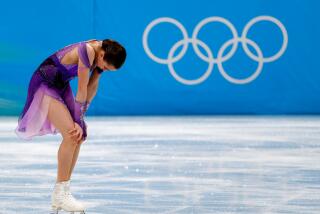The Times Q&A: Travis Tygart, U.S. Anti-Doping Agency CEO
- Share via
Our Travis Tygart interview is the fourth in a series of Q&As with prominent sports figures. The Q&A features will run every Monday.
Travis Tygart is the chief executive of the U.S. Anti-Doping Agency, effectively making him the nation’s top policeman in the fight against performance-enhancing drug use by elite athletes.
He has tested everyone from Lance Armstrong to Floyd Mayweather Jr., battled famed steroid distributor Victor Conte and pushes Major League Baseball and the NFL for more stringent testing.
Some say the use of performance-enhancing drugs has been so pervasive in sports like baseball, cycling and track that it’s not even worth trying to police. What makes you want to be the enforcer?
Clean athletes. At the end of the day, if athletes don’t have hope they can compete without endangering their lives or breaking laws to compete in sports, sport is rendered meaningless. There’s millions of athletes and parents who depend on us doing the right thing, to have sports clean.
What are your thoughts when you see surprising performances on television — an average hitter suddenly leading the league in home runs, a pedestrian runner winning a world track event or a cancer survivor winning seven Tours de France?
You want to believe, but as the head of USADA, I question everything. The obvious objective question is: What anti-doping system is the sport held to? I have a lot more confidence in those sports held to the gold standard, the WADA [World Anti-Doping Agency] code. It’s unfair to assume someone is using . . . only because they have an incredible performance. Unfortunately, a few bad apples — Marion Jones, Barry Bonds — have tainted the fans and caused people to have those questions.
This summer, ex-big leaguer and current minor leaguer Mike Jacobs was the first U.S. athlete to test positive for human growth hormone. What was your reaction?
Baseball deserves credit for instituting minor league testing [last year]. If you don’t have a test, you’re not going to deter or detect use. This is a good example of how athletes will succumb to the temptation to win and advance their careers at all costs. It’s a perfect example of why you need testing in place to stop the athletes who’ll stop at nothing to win.
Is this HGH test adequate to extend to other major sports, notably the NFL?
Absolutely. It’s necessary to have it in place. If you’re not testing for growth hormone, the culture of the sport is, ‘You’re not being competitive if you’re not using.’ You have to break that culture. There’s no legitimate reason to not have the HGH test in place.
The NFL players’ union has raised questions about proposed HGH tests, citing reliability concerns, for not embracing a WADA-supervised plan. Your reaction?
There’s just no good reason. The amount of blood taken — thousands of athletes around the world, minor leaguers and boxers can attest — is minuscule. There’s no question of the reliability [of our HGH test]. This is one lawyer for the [NFL] union versus hundreds of experts and top scientists.
There’s an interesting Court of Arbitration for Sport decision due by Sept. 30 that could force star U.S. 400-meter runner LaShawn Merritt, and others, to miss their next two Olympics because of past banned substance use. Is that punishment appropriate?
We frankly think it’s one of the most important decisions since the WADA code has come down. We provided a brief saying someone like Marion Jones, a sophisticated, intentional cheater who cheated at the Olympic Games, should never compete in an Olympics again, but discussed how some [violations] are not at as egregious. [Merritt tested positive for a steroid found in a penile enhancement product.] We’re firm believers in redemption, and feel like there should be a review [appeal] process.
Do you worry that the U.S. is policing its sports so well that it will hurt the number of Olympic medals the team wins?
I’m glad that question is finally being asked, because 10 years ago, the world was asking us about lagging behind. I’m thrilled our athletes are viewed as being judged by the highest standard in the world. It’s an injustice to see that not happening everywhere. We use our voice and resources to ensure worldwide competition is fair. It starts by asking every program, ‘Are you WADA code? Are you implementing it effectively?’ Too many can’t answer in the affirmative.
twitter.com/latimespugmire
More to Read
Go beyond the scoreboard
Get the latest on L.A.'s teams in the daily Sports Report newsletter.
You may occasionally receive promotional content from the Los Angeles Times.











